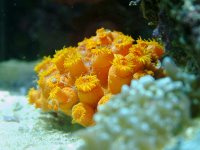Bending the Third Rail
Because We Should, We Can, We Do
Cost of the War in Iraq
(JavaScript Error)
Wednesday, July 05, 2006
Global Warming
 The fact that global warming is occuring at an alarming rate isn't much in the way of news. Nor is this:
The fact that global warming is occuring at an alarming rate isn't much in the way of news. Nor is this:The WP fronts the increasing evidence that the increase in carbon dioxide in the atmosphere—which has given us the gift of global warming—is also causing the oceans to become more acidic, which in turn "could decimate coral reefs and creatures that underpin the sea's food web." As one researcher put it, "CO2 levels are going up extremely rapidly, and it's overwhelming our marine systems."I just wanted to add (again) my own anecdotal example of this phenomena.
I keep a marine aquarium. If I use tap water, even after the chlorine has degassed, the aquarium explodes into an algae bloom and all the marine creatures die. So to remedy this, I've had to install a reverse osmosis water filter to purify the water enough to be added to the tank.
Air quality is also crucial for a marine aquarium. There is an intimate interaction between the water surface and the air that helps maintain the proper, and relatively narrow, ph in the tank. A co2 disequilibrium results in the gas moving from one to the other. The normal circumstance is for aquarium water to have an excess of co2 (in the form of carbonic acid) and to off-gas from the water surface into the air. This helps to maintain a somewhat alkaline environment in the tank. It's also why marine aquariums need a lot of agitation on the water surface, unlike fresh water aquariums.
During the winter time when the aquarium room is closed, and there is human activity in that room, the co2 level rises in the room. As it does, the ph in the tank rises as well. If left unchecked, the tank inhabitants ultimately die and you have a dead tank. Mind you, it only takes a couple of people in a 10'x 20' room to see this effect begin. Many avid hobbyist have resorted to drilling a hole in the wall and installing an air pump to continually supply fresh air to the aquarium simply because of this phenomena.
In the above description, substitute the ocean for an aquarium, the open air for room air, and waves for the pump agitation in the tank. Except in the open air, as co2 rises there's nowhere to draw "new" air from.
Just imagine for a moment the actual amount of co2 that must be involved to change the ph of the ocean. If the animals of the marine environment significantly decline or die-off (as they are now), watch for a drastic change in the food chain and acceleration of global warming as the vast number of these animals give off oxygen which helps counter global warming.
7 Comments:
About Me
- Name: Greyhair
- Location: Wine Country, California
I'm a very lucky person with every allergy known to man but still happy to be enjoying a wonderful life living in the best place in the world!
Blogroll
The Big PictureBillmon
Blah3.com
Born at the Crest of Empire
Eric Alterman
Eschaton
FireDogLake
Feingold's Blog
Dan Froomkin
The Huffington Post
Hullabaloo
The Illustrated Daily Scribble
Jesus General
Juan Cole
Matilda's Advice and Rants
Mia Culpa
MsJan Quilts
Needlenose
The Oil Drum
Political Animal
Political Wire
Spooks of the Ozarks
Talk About Corruption
TalkLeft
Think Progress
War and Peace
The Washington Note
Wow, blogger is being a butt today.
on both counts .....
As it does, the ph in the tank rises as well.
I was under the impression that CO2, combined with water, forms HCO3 + H^+. Which would indicate, that number of protons rises, which makes pH _fall_.
What animals do you keep? Got a list?
I'm currently combating cyano-bacteria, courtesy of heavey heavey feeding in early stages of my tank. Other than that, I keep a few discosomas, xenia, pachyclavularia, some sponges, a few stony corals (your regular montiporas and such) and the like. No fish.
My tank is about like yours. A few stony's, some xenia, a couple of clams and some run-of-the mill softies. I do have the ever present two damsels that refuse to ever die and a yellow tang that helps keep other algaes under control. I have a huge rock crab that has completely eaten my corraline algae ... but I just don't have the heart to get rid of him. As far as cyano ... good luck. When I struggled with it, an RO unit, minimized feeding, protein skimming and very very careful siphoning off of the offending bacteria was the solution. It's my understanding that cyno can result from excess phosphates in the system, thus the minimizing the amount of organic input becomes necessary. Probably more than anything, taking time to carefully care for your tank as it matures. Sounds like you have a bead on it with your understanding of early tank feeding.
Ever hear of Reef Central on the web? I was one of three co-founders of that cite. Then the usual BB flame wars drove me away to other endeavors.
I'm combating cyano with no feeding (I have no fish or other animals that would need "active food input"), water changes (I've been using RO since day one) and a huge fuge with chaeto and caulerpa. I left caulerpa grow in the main tank as well - it's a lot easier to prune than to syphon out the bacterial mats.